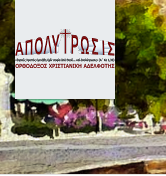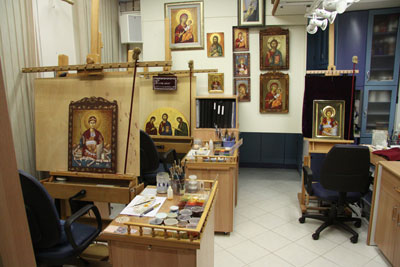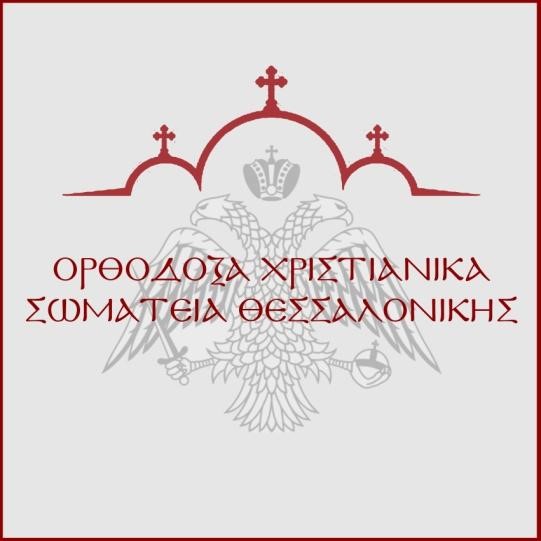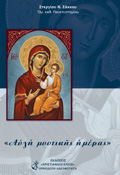Dr Despoina M. Kalogeraki, Bth, Mth, PhD
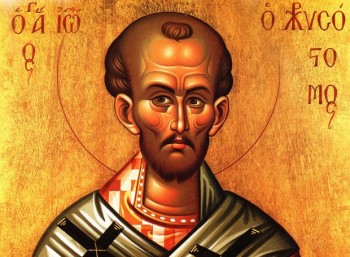 It is a fact that St. Chrysostom, “the great ecumenical teacher”, as the Orthodox Church chants, has not written a, let us say, systematic pedagogical piece of work, in the strict sense of the word. However, if we were to study his hermeneutical works thoroughly, we would gather a treasure of teaching elements about pedagogy (Gk παιδαγωγία). He actually belongs to the chorus of founders of Christian pedagogy. Since his pedagogy is being based on theology, it has undoubtedly a timeless value. St. Chrysostom was not a philosopher1. On the contrary, he was a theologian whose teaching was first and foremost, a living experience. It is said that St. Chrysostom was the stubborn champion of assiduous Bible reading, even among the laity. This very fact makes his pedagogical principles part of his theology.
It is a fact that St. Chrysostom, “the great ecumenical teacher”, as the Orthodox Church chants, has not written a, let us say, systematic pedagogical piece of work, in the strict sense of the word. However, if we were to study his hermeneutical works thoroughly, we would gather a treasure of teaching elements about pedagogy (Gk παιδαγωγία). He actually belongs to the chorus of founders of Christian pedagogy. Since his pedagogy is being based on theology, it has undoubtedly a timeless value. St. Chrysostom was not a philosopher1. On the contrary, he was a theologian whose teaching was first and foremost, a living experience. It is said that St. Chrysostom was the stubborn champion of assiduous Bible reading, even among the laity. This very fact makes his pedagogical principles part of his theology.
Being an eminent pedagogue and, as a matter of fact, excellent connoisseur of human psychology2, St. Chrysostom with his teaching has introduced a timeless, integrated pedagogical system.
The period that Chrysostom lived (344/354-407), was a rather difficult time in many aspects. That is why Christian teaching was accepted by people from every social class. During this very period, spiritual fathers of the Church, apart from St. John Chrysostom, having as a starting point the teaching of the Holy Scripture and simultaneously, based on the Holy Tradition (Gk Παράδοσις)3, have studied fundamental issues of the education (Gk ἀγωγή “agogi” meaning the act of leading), in other words, issues concerning pedagogy (Gk παιδαγωγία meaning leading young people-παῖδες- by teaching). Thus, the foundation of what we call “Christian pedagogy”4 has been laid by a number of Christian teachers of that period.
All these enlightened teachers were inspired by the teaching of the foremost teacher, the Lord Jesus Christ Himself. We also have to mention the pedagogical concepts of St. Paul5 who was the most eminent pedagogue in Christ (Gk ἐν Χριστῷ), as well. His teaching exemplifies the connection and interdependence between theology and pedagogy in Christ. For, as St. Paul confesses “it is no longer I who live, but it is Christ who lives in me” (Gal 2:20)6. Thus, he is the one who embodies the teaching of Jesus Christ the Teacher and our Savior.
Let us briefly refer to the pedagogical works of the teachers of the first Christian centuries, during which fathers of the Church have actually formed the pedagogical system of the Church. It has been accurately said that Christianity is a “religion of pedagogy”7. I esteem that it is a very proper characterization as its ultimate goal is to lead all people who are God’s children, to their final destination, namely near God. For, God “desires everyone to be saved and to come to the knowledge of the truth (1Tim 2, 4).
Moreover, during that “golden” period of the history of the Christian Church, there were people who have written relative works. Firstly, Clement of Alexandria (2nd century), has written the “Pedagogue”8, Basil the Great (+379), John Chrysostom (+407), as an ecclesiastical teacher and preacher at the same time9, Jerome (+420) and St. Augustine (+430). Additionally, St. Cyril of Jerusalem (+386) has written the Catecheses10, St. Gregory of Nyssa (+394) and Kassianos the Roman (end of the 4th century)11 as well. All the above mentioned, have put together the axioms that form the Christian pedagogy, which is not a secular approach to the issue of counseling young people but an approach through the prism of Christian theology. These axioms and principles stay unchanged in our spiritual tradition and remain valid till today. Contemporary teachers, ascetics like St. Prorfyrius, Paisius the Athonite, Sofronios of Essex and many others have continued to espouse and underscore the principles of pedagogy that have been laid on the basis of Orthodox theology.
Specifically, the pedagogical and phycological principles of the teaching of St. Chrysostom, are embedded in many of his pieces of work12 but there are some of them that would be of special interest to our subject matter13. Namely, homily “to a widow must be said that…”, homily “to Anna…”, homily 21st “on Ephesians”, homily 9th “on the first letter to Timothy”, homily 27th “about children’ upbringing”, Logos 3nd “to a faithful father”, homily 21st “on the Gospel of Matthew” and homily “About vanity and how are parents supposed to raise up their children”14.
Let us have a look at some of John Chrysostom’s fundamental pedagogical ideas. We will explore some ideas concerning the value and the purpose of “agogi” and the profile of a pedagogue as well, according to Chrysostom’s pedagogical system. Examining these aspects of St. Chrysostom’s pedagogical ideas, we will witness the interrelation between theology and pedagogy in his thought.
....................................
1. As he actually notes in his exegesis “you teach by words? But this is easy, to philosophize in words: teach me by your life· that is the best teaching. You say that it is right to be moderate, and you make a long speech about this thing, and play the orator, pouring forth your eloquence without a check?” St. Chrysostom, On Acts, Homily XXX.
2. A. Danassis, Johannes Chrysostomos, Pädagogisch – Pshychologische Ideen in seinem Werk, PhD work, Bonn, 1971, Bouvier Verlag Herbert Grundmann. Also, see S. Seidlmayer, Die Pädagogik des Johannes Chrysostomus, München, 1923, Münster, 1926.
3. Gk ἹεράΠαράδοσις, meaning the teaching of the Holy Scripture as it is interpreted by the very life of the Church. There are four main sources, the Word of God laid down in the Holy Scripture, the definitions of the Councils, the liturgical texts and the writings of the Fathers. For the Orthodox Church, the Holy Scripture on the one hand and the Holy Paradosis (tradition) on the other are the two pillars of its faith.
4. J. Kogoulis, Catechetical and Christian Pedagogy, ed. Kyriakidis, Thessaloniki 1990.
5. A. Mpitsakis, The education of man according to St. Paul, ed. Gregory, Athens 1968
6. References from the Bible, as well as abbreviations of them (see pp. xxvii-xxviii) follow New Standard Revised Version of the Bible.
7. D. Moraitis, Pedagogical ideas of the three Hierarchs, ed. Gregory, Athens 1968.
8. Clement of Alexandria, All works, The Pedagogue, 1 EΠΕ, 112, ed. “Gr. Palamas”, 1992.
9. See P. Mpratsiotis, The revival of the Three Hierarchs through the centruries, ed. Ap. Diakonia, Athens 1972.
10. St. Cyril of Jerusalem, Catecheses, ed. “Etoimasia”, Kareas 1991.
11. Abbas Kassianos, Talking with the fathers of the desert, ed. “Etoimasia”, Kareas 2004 (vol. A), 2006 (vol. B).
12. See bibliography
13. For the English translation in this article, Philip Schaff’s translation is followed wherever necessary.
14. Concerning this homily there is a dispute among the interpreters with regard to its fraternity. See D. Moraitis, John Chrysostom’s pedagogy, About vanity and how are the parents supposed to raise their children, Library “Papyrus”, n. 96, Athens 1940. With regard to the fraternity issue see pp. 3-20.
Copyright © 2021 by Orthodox Christian Association «ΧΡΙΣΤΙΑΝΙΚΗ ΕΛΠΙΣ» ΟΡΘΟΔΟΞΗ ΑΔΕΛΦΟΤΗΤΑ. Used by permission. All rights reserved.

